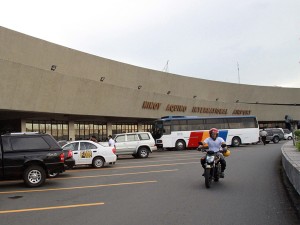
Facade of the Ninoy Aquino International Airport Terminal 1 in Pasay City taken on Oct. 18, 2011. INQUIRER PHOTO/RODEL ROTONI
MANILA, Philippines – Airline companies have urged the government to operate all key airports, not just Ninoy Aquino International Airport (NAIA), on a 24/7 basis to make the country more tourist friendly and to help decongest Manila.
They said the present one-shift system, which starts at 8 a.m. and ends at 5 p.m., is no longer done globally, and is also the reason used by airport customs, immigration, and quarantine (CIQ) personnel to charge airlines for overtime. Airport customs had expanded this unilaterally to include meals and transportation allowance.
Bayani Agabin, spokesperson of the Board of Airline Representatives (BAR), said the move will certainly boost the country’s campaign to project itself as a major tourist destination and an important regional player.
Finance Secretary Cesar Purisima, as head of the economic cluster, recently ordered CIQ officials to discontinue the outdated one-shift practice and go on three shifts 24/7.
BAR, in a press statement, welcomed the move and hoped the required budget for it would be released soonest.
In 2005, customs personnel doubled their fees on account of the doubling of the peso-dollar rate from around P26 to P52. BAR balked at the increase and went to court, arguing that the customs personnel were government employees, not theirs.
But BAR continued paying immigration and quarantine, which did not double their overtime billings.
Purisima’s order, Agabin said, should apply to all CIQ personnel and divisions not just in Manila but also in other international gateways including the airports in Clark, Puerto Princesa, Cebu and Kalibo.
Before Purisima, former Customs Commissioner Lito Alvarez ordered the adoption of three shifts at NAIA effective January 2011. Airport customs personnel, however, continued the present set-up and kept sending bills to the airlines for overtime.
BAR also said should all key airports go on 24/7 mode, airlines can fly directly to these destinations, bypassing Manila, without overtime charges, “a right step toward making the country more competitive and NAIA less congested.”